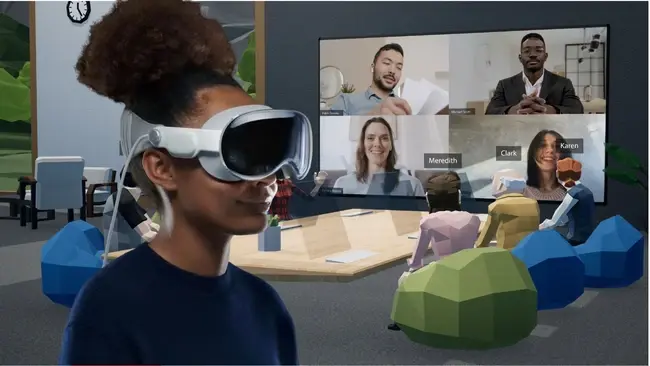Apple’s much-anticipated Vision Pro headset, which promises to “seamlessly” blend the real and digital world, may breathe life back into the barren metaverse space.
The AR device, announced at Apple’s annual World Wide Developers Conference (WWDC) yesterday, allows users to “see, hear and interact with digital content just like it's in your physical space".
Unlike current VR headsets, it is controller-free, enabling users to interact with app icons by simply looking at them using a new Apple operating system called VisionOS.
In a keynote address at WWDC, Chief Executive Tim Cook claims the device would "introduce us to spatial computing – in the same way, that Mac introduced us to personal computing and iPhone introduced us to mobile computing.”

“Vision Pro blends digital content into the space around us. [It] will change the way we communicate, collaborate, work and enjoy entertainment,” Cook said.
“It’s the first Apple product you look through, and not at. With Vision Pro, you’re no longer limited by a display. Your surroundings become an infinite canvas. Vision Pro blends digital content into the space around us.”
The device, which looks like a pair of ski goggles, is primarily an AR device but can switch between augmented and full virtual reality using a dial on its side.
Apple compared the device to a new TV, surround sound system, powerful laptop, and games console all in one – before revealing its price, a whopping $3,499 – $500 more than the already high price tag rumoured in the run-up to the event.
“Apple Vision Pro relies solely on your eyes, hands and voice,” said Apple vice-president of human interface design Alan Dye.
“You browse the system simply by looking. App icons come to life when you look at them; simply tap your fingers together to select, and gently flick to scroll.
‘Spatial Computing'
Apple’s announcement comes days after Meta unveiled its Quest 3 VR headset – to much less excitement.
The headset market saw a 54 per cent drop in global sales last year, according to the International Data Corporation.
CEO Mark Zuckerberg has put all of Meta’s eggs into the Metaverse basket, going as far as to change the firm’s name from Facebook to Meta to emphasise its shift in focus towards virtual spaces.
The CEO has refused to back down despite the project losing billions of dollars, telling staff in meetings last year that spending on Reality Labs – the division focused on building the metaverse into a set of products – would only increase as times got tough.
Meta’s metaverse has been largely abandoned by the tech world, garnering little attention from business leaders and investors. Some have even gone as far as describing the project it the ‘meh-taverse’, due to its lacklustre capabilities and false promises
Zuck after a decade and $50B spent on a VR platform watching Tim Cook scoop him with the category-defining Apple Vision Pro. pic.twitter.com/oITKRmDqw0
— Trung Phan (@TrungTPhan) June 5, 2023
But Apple’s announcement appears to have re-ignited the spark of these virtual spaces – except Apple appears to prefer to use the term “spatial computing” to refer to its technology rather than ‘metaverse’ in a bid to seemingly distance itself from Meta.
In fact, the word ‘metaverse’ was not used a single time during the entirety of the keynote announcing Vision Pro.
The fight for the metaverse (or whatever you want to call it)
Regardless, with Apple entering the virtual worlds space, the fight for control of the metaverse market is certainly on.
Unfortunately for Zuckerberg, none of his company’s devices appears to come anywhere close to the capabilities of the Vision Pro, with the only positive for Meta being the price tag, which sits at $3,000 lower than Apple.
this says all you need to know about apple vs meta pic.twitter.com/0sd9CjIA5s
— ali (@_ali_taylor) June 5, 2023
Still, the fact that another major tech player has entered the space will drive both interest and innovation in VR and metaverse applications.
But both Meta and Apple still have many hurdles to overcome. For one, other technologies such as AI are already capturing much of the public’s attention.
Since the release of OpenAI's ChatGPT last November, the eyes of tech leaders and industry watchers have been fixated on generative AI, with companies locked in and figuring out how they can best use the technology.
Trying to turn the conversation away from AI and towards the metaverse will be one of the industry’s biggest challenges if it wishes to truly capture the world’s attention. If there were one company that had any chance of doing this, it would be Apple.

London Tech Week is a global celebration of tech, uniting the most innovative thinkers and talent of tomorrow in a week-long festival.
For 2023, LTW returns to Westminster with a full takeover of the Queen Elizabeth II Centre. Across 3 days and 7 floors, the event brings together inspirational founders, top business leaders, policymakers, investors and rising stars to engage in discussions on technologies that will unlock new opportunities and transform the future.
Showcasing how tech is transforming business and society, London Tech Week drives thought-provoking conversations around innovation, diversity and transformation, providing a platform for the tech ecosystem to come together to drive change.
Visit https://londontechweek.com to register and learn more!




Comments ( 0 )